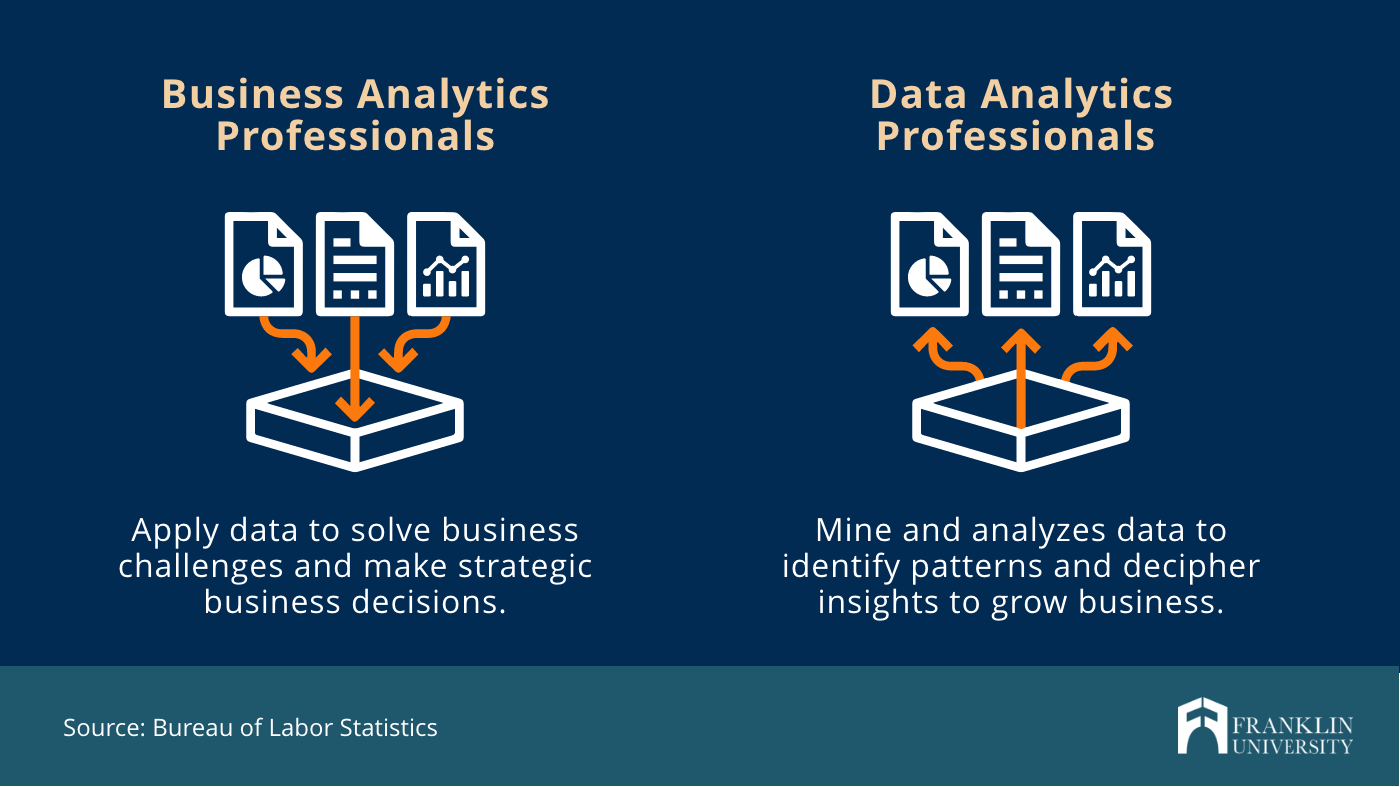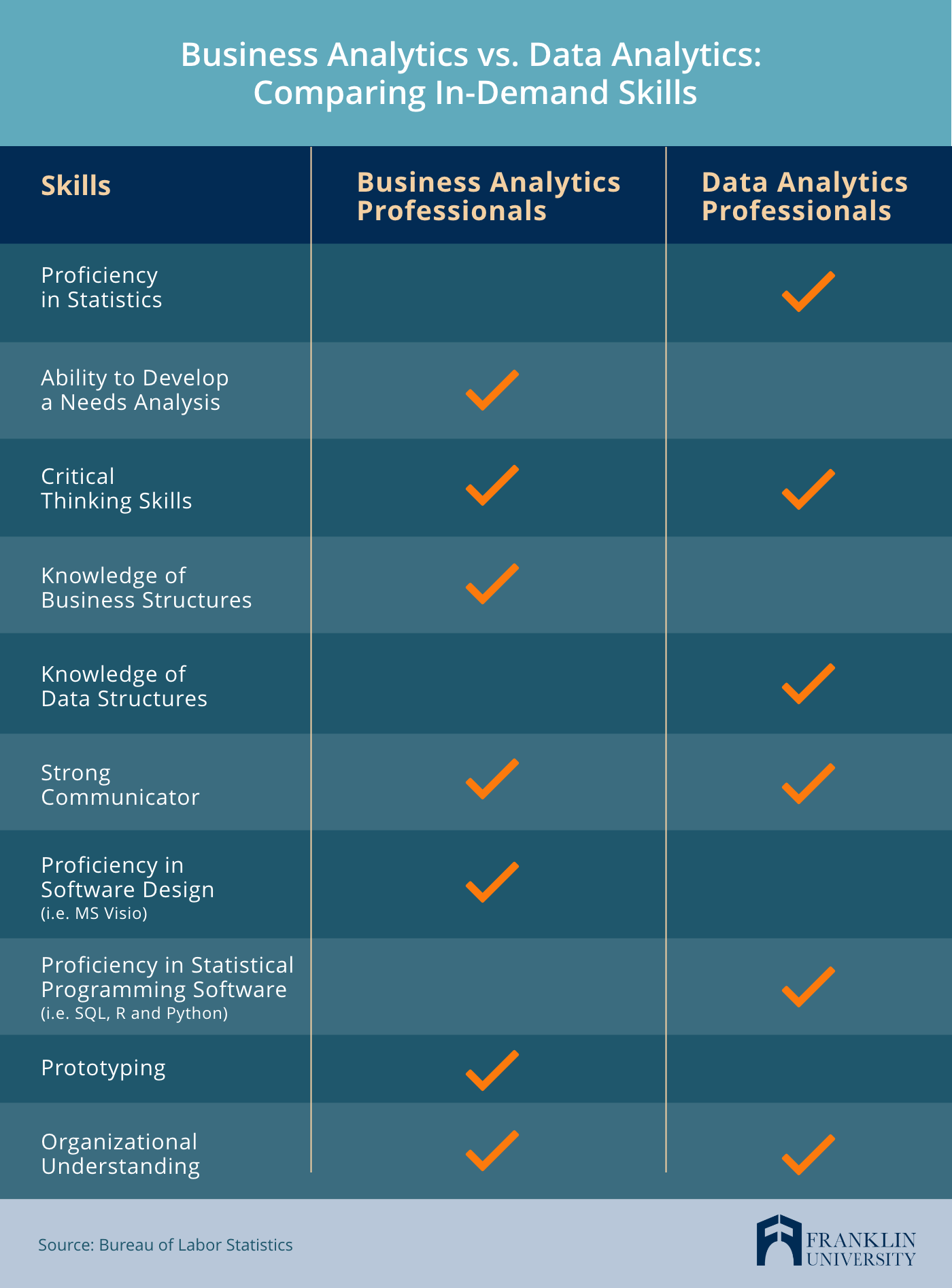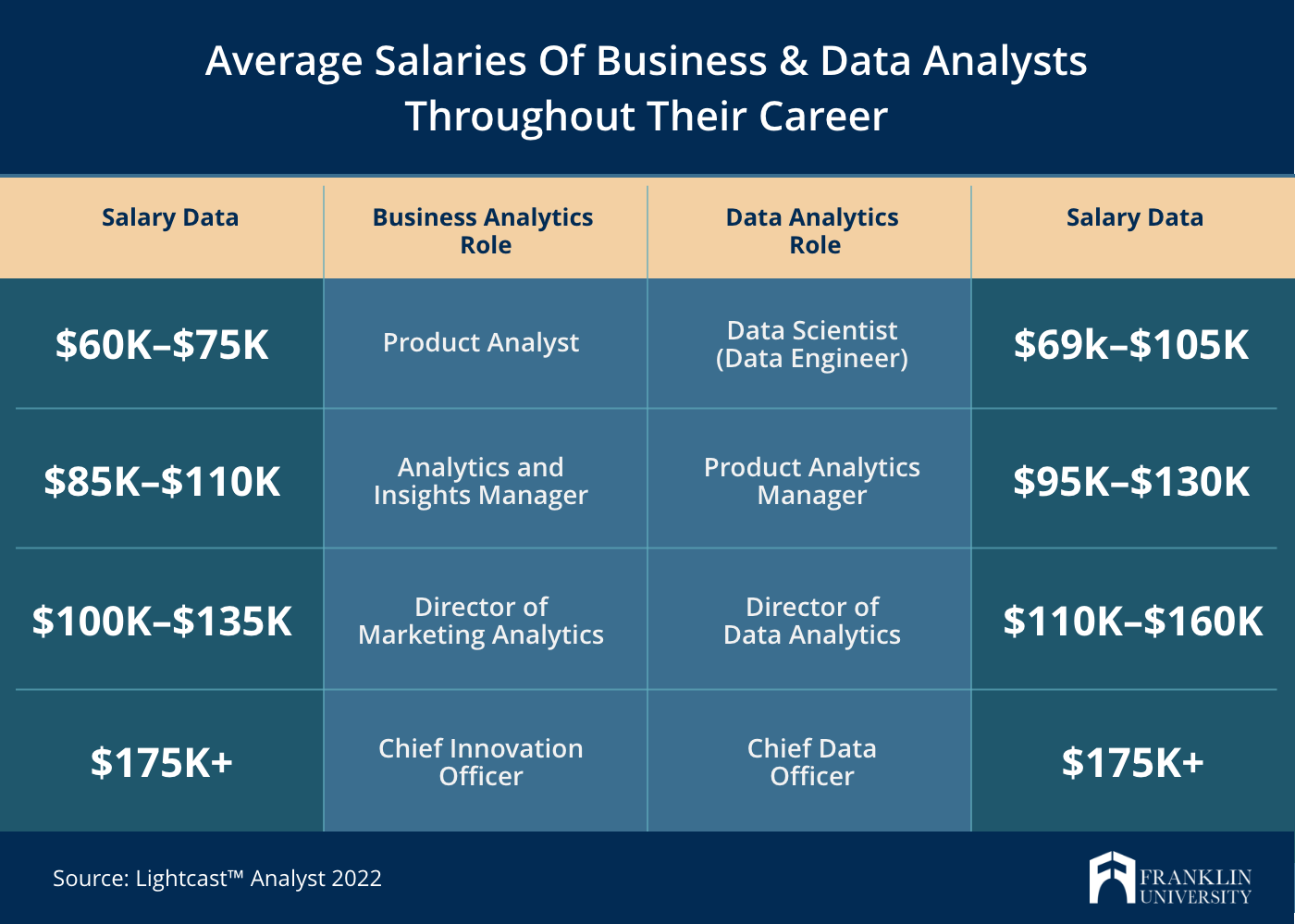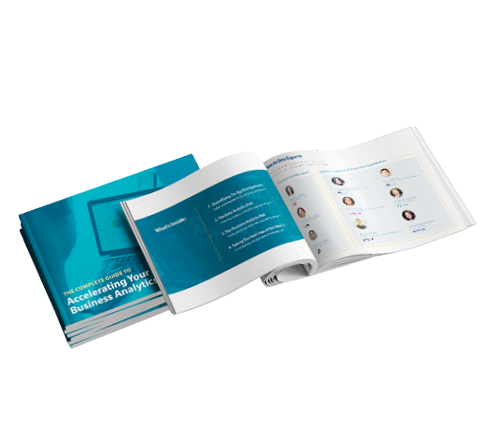Request Information
We're Sorry
There was an unexpected error with the form (your web browser was unable to retrieve some required data from our servers). This kind of error may occur if you have temporarily lost your internet connection. If you're able to verify that your internet connection is stable and the error persists, the Franklin University Help Desk is available to assist you at helpdesk@franklin.edu, 614.947.6682 (local), or 1.866.435.7006 (toll free).
Just a moment while we process your submission.

Big Data Differences: Business Analyst vs. Data Analyst
Big Data is changing the way we do business in every industry. It’s why there’s a need for people who specialize in business analytics and data analytics.
At their core, each are professionals who can manage, analyze and derive insights from data while also connecting data-based insights to business decisions. Understanding the differences between how this is done will help you make the decision on which career might be right for you.
Let’s look closer at each of these roles and what a career in business analytics or data analytics would look like.
What Business Analytics Professionals Do
“Business analytics professionals focus on applying the insights derived from data to address business problems. This role identifies where companies could do better, and how to get there using data,” says Jiang Li, Ph.D. chair of the M.S. in Business Analytics and lead faculty for the M.S. in Data Analytics at Franklin University.
In this role a professional uses the data at hand to help their organization uncover problems, discover opportunities and craft solutions.
“Business analytics professionals analyze data and assess requirements from a business perspective. They explore data and utilize, manipulate and apply well-established data models based on different business scenarios to make decisions,” Dr. Li explains.
Companies used to rely on a business analyst to help make directional decisions but Dr. Li clarifies that “...as data has become more prevalent as a decision-making tool within businesses, the roles of the business analyst and the business analytics professional have overlapped in recent years.”
Typical Responsibilities of a Business Analytics Professional
- Define the processes, business structure and other functions of the company.
- Review the data associated with each function.
- Interview key members of the team who touch each of the functions in review.
- Inform company leaders of your findings and the changes you suggest.
Business analytics focuses on creating solutions and solving existing challenges that are unique to the business and usually stay at the forefront of the data pipeline.
Get a FREE roadmap that includes insider information to help you maximize the many opportunities in the fast-growing field of Big Data.
What Data Analytics Professionals Do
Data specialists often use big datasets to find the answer to questions both known and as yet unasked.
Dr. Li explains that data analytics professionals “Employ a lot of statistical, database and computer programming skills to design and build data models that people like business analytics and health informatics professionals will manipulate for decision making.”
Typical Responsibilities of a Data Analytics Professional
- Work with leaders to define a need (or problem) within the business.
- Design databases and data systems.
- Locate the data needed to address the pre-defined need.
- Analyze the data.
- Present the results of your analysis to leadership.
“Data analytics is the process of analyzing and mining data—sorting, storing, cleansing, identifying patterns and interpreting insights by using various statistical techniques, Big Data processing and technology,” Dr. Li says. “Data analytics is more technical than Business analytics as it requires advanced statistical methods as well as coding.”
The Skills to Succeed in Data Analytics and Business Analytics
The need for data professionals to manage and interpret data is not just present, it’s growing quickly. The U.S. Bureau of Labor Statistics projects a need for 3,000 new data jobs on an annual basis through 2030.
The skills you may need to capture one of these new jobs (or to build your current career) depend partly on what you want to do with data. Regardless of the path you take, there are certain baseline skills you’ll need.

Who Makes More: Business Analytics Professionals or Data Analytics Professionals?
While any career should be based on what you’re interested in and what you love to do, there inevitably is a consideration around what your compensation could be.
(These numbers should be considered as a snapshot as education, experience, even location can affect your ultimate salary.)

Which Analytics Path is YOUR Path?
With the similarities between the roles, it’s important to dig deeper into their responsibilities as you decide which is the right path for you to take.
Dr. Li breaks down the two career paths to their basic parameters saying, “If a person has an intense curiosity to answer business questions, loves exploring hidden patterns in data, and enjoys solving new business problems, business analytics is a good fit.”
“If a person has a technical background and loves discovering the patterns buried in the complex data using data science methods and programming technologies, data analytics is a good fit,” Dr. Li adds.
Starting Your Journey
When you’re ready to strengthen your career, or start it, Franklin University offers analytics-focused degree and certificate programs. Through them you’ll be exposed to not only theory and practice but practical, real-world experience from the seasoned faculty at Franklin.
“Our programs are very applied,” Dr. Li says, “which is good for applicants, most of them who are working adults, who want to switch career paths or get promoted in the field.”
If you are interested in a more technical application of data you could earn an M.S. in Data Analytics and learn the data mining, analyzation and presentation skills you need to make an impact immediately.
With an M.S. in Business Analytics from Franklin, you could get the skills and experience you need to help transform business.
Part of the strength of the program at Franklin is the support behind it.
“We have an advisory board of industry experts supporting our program,” Dr. Li says. The curriculum is built and revised frequently based on the suggestions from the board members. For example, we are planning to add more R content based on practical needs we’re seeing in the workplace and the advice of the board.”
Business analytics professional. Data analytics professional. Learn more about how you can turn the demand for both into a career you can be proud of.





